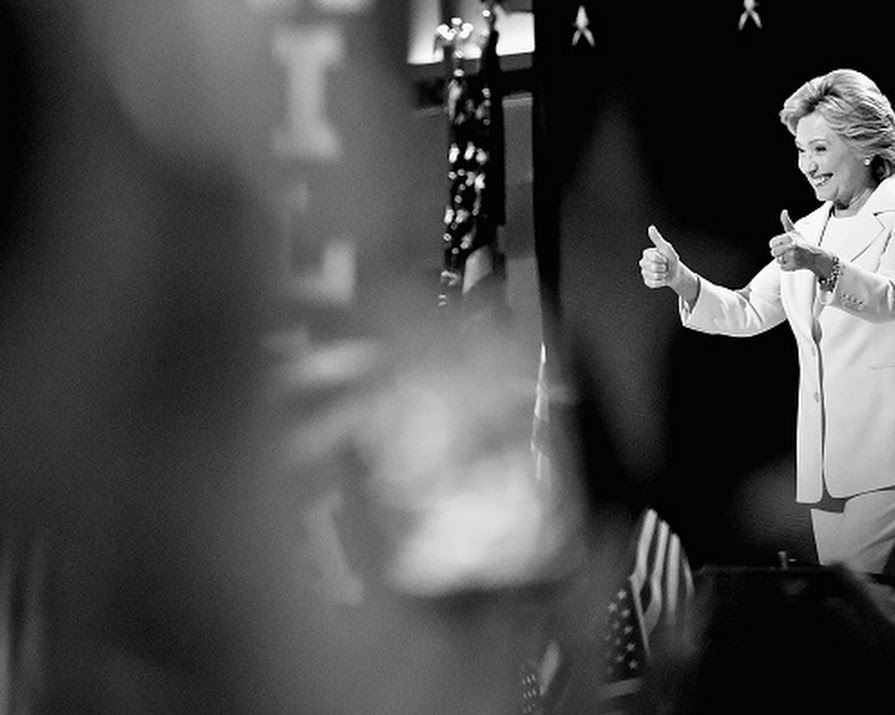
By IMAGE
17th Sep 2016
17th Sep 2016
If Hillary Clinton is elected President of the United States, we’re in for a new world of female governance. Marion McKeone reviews the current political playing field and wonders if femocracy is the way forward.
As Hillary Clinton looks increasingly likely to become the first female President of the United States, the dawn of a new world order may be emerging. If she succeeds, 2017 will become the year that the three most powerful countries in the Western world – including its two biggest military superpowers – are simultaneously led by women.
And they’re in good company. Twenty-one countries will have female leaders or heads of state next year – including Chile, Norway, South Korea, Taiwan, Myanmar and Poland. Christine Lagarde is expected to remain at the helm of the International Monetary Fund until 2021. Dr Margaret Chan is director general of the World Health Organization. Of the dozen candidates seeking to become the next secretary general of the UN, half a dozen are women, including the current favourite for the post, UNESCO director general Irina Bokova.
But wait. Let’s look at this another way. When you boil down the slew of statistics proffered by various international organisations, a bald figure emerges: Just ten per cent of world leaders (including Queen Elizabeth) are women. Is this really something to celebrate or should it serve as a spur towards more equal representation? Internationally, women’s participation in politics is still around 20 per cent.

The fact that the election of a woman US President would be a historic event shows not how far we’ve come, but rather how far we have to go before the election of a female leader becomes as unremarkable as the election of a male. That a female leader, judge or CEO is still an aberration, not the norm in government, business and the legal system shows we’re still a long way from true equality.
Running a country – or company – is a function of leadership, not gender or ethnicity. But as the 2016 US Presidential campaign has shown, a hefty portion of the American electorate is a long way from realising that.
Female writers have written somewhat optimistically about what this new order will bring: whether the new ?femocracy? will result in a stabilisation of a world that seems increasingly treacherous as it wrestles with the global threats presented by climate change, terrorism and globalisation.
Theresa May emerged from what was the most brutal period of politics in living memory in Britain, almost Shakespearean in its series of betrayals, treachery and power grabbing. May is regarded as tough, no-nonsense and competent. ?A bloody difficult woman? to paraphrase veteran Tory Ken Clarke. No doubt she would take this as a compliment. Angela Merkel is widely regarded as Europe’s most popular and powerful leader, a distinction she has held for more than a decade.
Female politicians are known to bring more diverse policy issues to the table – particularly those concerning women, children and disadvantaged groups, according to the National Democratic Institute. But while this may be true of politicians like Hillary Clinton, who has spent half a decade focused on the rights of women and children, with varying degrees of success, neither May nor Merkel have been particularly effective at advancing the cause of a level playing field for men and women.
The US lags way behind Germany and the UK in representation at legislature level. In Germany, 37 per cent of parliamentarians are female. In the UK, the figure is 29 per cent; in the US, it’s 19. The percentage of female elected representatives in Ireland, meanwhile, is 22.2 per cent.

It is widely accepted that the ?critical mass? of political representation that women need to reach to achieve real change is 30 per cent. Should she become President, Clinton will find herself in a far more hostile environment than May or Merkel, with far fewer potential allies.
It’s fair to speculate that should she become the 45th President in January, her battles will only be starting. While this may be the nastiest, most divisive and brutish election campaign in US history, it is likely that it is just a precursor of the congressional war a Clinton victory will unleash.
Both May and Merkel benefited from a presumption at the outset of both their leaderships of trustworthiness and competence; Clinton will become the leader of a country where 50 per cent of the population loathe her, distrust her or think she is not qualified to be President, notwithstanding the fact she is the single most qualified candidate to ever run for office.
In fact, she herself would probably admit that her likely presidency owes more to Donald Trump’s implosion as a candidate than her own powers of persuasion and skills as a campaigner, notwithstanding her formidable intellect and unrivalled experience.
When Obama, passing the baton to Clinton at the Democratic Convention in Philadelphia, said there had never been a candidate – ?not me, not Bill? – in the history of American politics as qualified as Clinton, he was not exaggerating. Eight years in the White House as the most influential First Lady in US history, a twice-elected Senator for New York and a widely praised Secretary of State.

And yet, no candidate in the history of US politics has been more scrutinised, vilified and reviled than Hillary Clinton. Seventy per cent of the Republican Convention in July was devoted to a frothing at the mouth, spittle- flecked orgy of anti-Clinton invective. Elected Republican officials goaded the already frenzied crowd by variously suggesting that Clinton should be ?put against a wall and shot?, ?hanged from a tree? and ‘strung up on Washington Mall?. A regular feature of Trump’s carnival barker act is his promise to imprison Clinton, to crow chants of ?guilty?, ?lock her up? and ?hang her?.
Part of anti-Clinton hatred is a primal fear of irrelevance. Trump’s campaign and his hardcore support is made up primarily of white working class males between the ages of 18 and 54, most of whom lack a college degree and almost all of whom have seen their wages stagnate or their relatively well paying manufacturing and mining jobs disappear over the past two decades. Bad enough having a black President lord it over them for the past eight years, the not so subtle subtext goes. But the idea of a woman – and not just any woman, but Hillary Clinton! – occupying the Oval Office is enough to trigger a collective fit of apoplectic rage.
Part of the deep polarisation Clinton inspires stems from the fact she’s been in the public eye for almost three decades. She has developed a thick skin, a penchant for secrecy and an opaque, legalistic defensive crouch when transparency would serve her far better. Those close to her say the constant attacks on her character wound her deeply.
The prism through which she is viewed – as a ball- breaking, bloodless Lady Macbeth – hasn’t changed since the 1980s. She jokes about her position as the most reviled woman in America when it comes to Republicans, but a sampling of the anti-Clinton tirades on social media, talk radio, cable news and at Republican gatherings provides little to laugh about.
She lacks Obama’s fluency, charisma and grace. Nor does she possess her husband’s peerless talent as a campaigner or his ability to reduce the most complex subject to an easily understandable couple of sentences.
But the perspective of how a leader should behave is broadening. And the new generation of female leaders is showing that the wielding of power can be more nuanced, conciliatory and effective. Unlike other Western leaders, Merkel has been unafraid to stand up to Russian leader Vladimir Putin, and she was applauded for welcoming one million migrants to Germany last year, over one-third of whom were refugees fleeing Syria.

Merkel’s bold move – at a time when the UK and other European countries were quibbling about accepting a fraction of that number – reflected a mixture of courage and vision, pragmatism and humanity.
But it seems that the type of leadership needed is changing. Amy Hillman, executive dean of Arizona State University’s WP Carey School of Business, says people have broadened their perspective of how a leader should behave. In a nutshell, brain has overtaken brawn. Obama’s cerebral, measured approach to world affairs has helped restore the US’s standing and repair the damage caused by his predecessor’s swaggering machismo.
?Changes in the work environment and a focus on the ?knowledge economy?, which produces ideas and innovation, have contributed to this shift in attitudes toward women advancing to the top,? says Hillman. ?It used to be that women who advanced were more masculine and authoritarian in their leadership styles. They had to act like a man to get the job.?
Now, she says, women are embracing the difference between men and women’s leadership styles. ?Women are surreptitious in their power, whereas men totally telegraph theirs – even when they don’t have any.?
It is harder to gauge the economic impact of political leadership, but studies show that firms with more female management leadership tend to be more profitable. A report by Catalyst showed a 16.7 per cent return on equity for companies that had at least three female board members; the average for all companies analysed was 11.5 per cent. And a 2013 Journal of International Affairs study showed that having a female leader in ?highly diverse countries? correlated with a 6.6 per cent higher GDP growth rate.
Below the surface, stories of glass ceilings and sacrifices made on the altar of advancement may become things of the past for other reasons: the rapidly changing needs and challenges of the global economy requires a different type of leadership.
The US, UK, and Germany all face huge challenges; the destabilisation of the EU by Brexit, an upsurge in nativism and right wing groups in response to the growing numbers of refugees and economic migrants. The spectre of terrorism looms large, as does confrontation with an increasingly belligerent Russia. Meanwhile, across the world, there seems to be a revolt against the status quo, an unprecedented distrust in national institutions and political systems.

In short, the time might be just right for women leaders to adopt a more holistic approach to global problems. Access to education and equal rights for women are two of the biggest contributors to prosperity and stability, yet they are historically low on the list of priorities of male leaders.
The US and UK have long had a ‘special relationship?, presenting a united front on international issues. And while it’s possible to imagine Clinton, May and Merkel hammering out pragmatic solutions to shared problems, it’s harder to imagine the sort of blind acquiescence that characterises old boy networks.
But there is evidence that the more women there are in political institutions, the more things get done. In the US, congresswomen co-sponsor more bills than men and recruit more co-sponsors than men, according to data gathered by Political Parity.
?Women come across that divide and say ?enough already?,? says Melanne Verveer, executive director of the Georgetown Institute for Women, Peace and Security. A long-time Clinton friend and ally, Verveer believes Clinton’s election would mean key issues such as childcare, equal pay and parental leave will shift from the margins to the centre stage. ?It’s part of her experience and her perspective. It’s who she is.? Would a record number of female leaders really have an impact for women around the world? In some respects, yes. Clinton’s record to date – almost half a century of working on women’s and children’s issues – suggests her leadership would bring about the most pivotal change. When she was Secretary of State, she dedicated herself to repairing the US’s image around the world. This was by repairing relations with allies on world stages, but also by funnelling microloans for women in developing countries and basics like eco-friendly cooking facilities. A series of studies by UN Women shows that female leaders engage a wider range of stakeholders in the governing process. According to the World Bank, increased participation of women in government is linked to lower levels of graft.
But would it change the course of global events? It is likely Clinton, May and Merkel would develop a more cohesive approach towards Russia, Iran, China, Syria, and other countries whose interests often run counter to those of the West. And it is also more likely that the root causes of many of the problems facing the world today might be tackled. Will they deliver a lasting global peace and prosperity? Unlikely. But they may eschew sabre-rattling and swagger for more productive and pragmatic solutions.
This article originally appeared in the October issue of IMAGE magazine, on shelves nationwide now.























